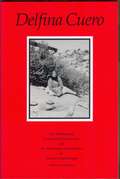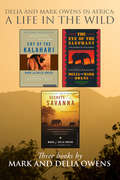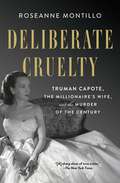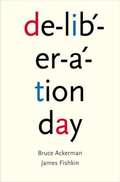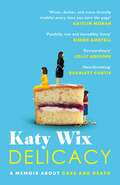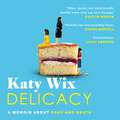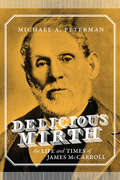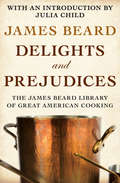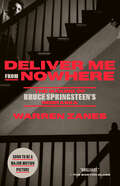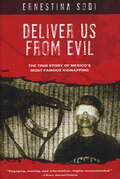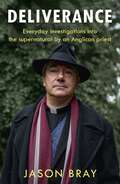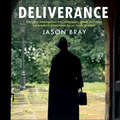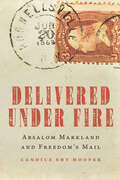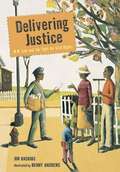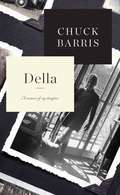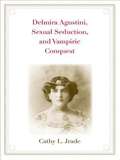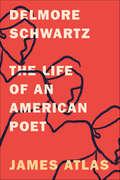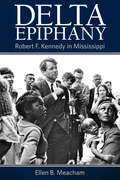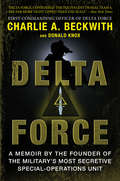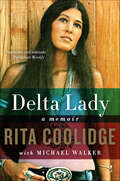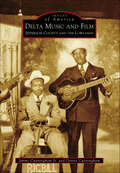- Table View
- List View
Delfina Cuero: Her Autobiography, An Account Of Her Last Years And Her Ethnobotanic Contributions (Anthropological Papers #38)
by Florence C. Shipek Sylvia B. VaneDelfina Cuero: Her Autobiography, an Account of Her Last Years, and Her Ethnobotanic Contributions
Delia and Mark Owens in Africa: A Life in the Wild
by Delia OwensDelia Owens, author of the best-selling Where the Crawdads Sing, began her career writing riveting real-life adventure and wildlife tales with her husband, Mark Owens. Collected in a single volume for the first time, these three odysseys show how the Owenses&’ &“ingenuity, courage, and accomplishment are beyond exaggeration.&” (People) Carrying little more than a change of clothes and a pair of binoculars, two young Americans, Delia and Mark Owens, caught a plane to Africa, bought a third-hand Land Rover, and drove deep into the Kalahari Desert. In this vast wilderness they met animals that had never seen humans before, and leopards, giraffes, and brown hyenas were regular visitors to their camp, all chronicled in Cry of the Kalahari. But the Kalahari is not Eden, and Mark and Delia were continually threatened by wildfires, drought, violent storms, and sometimes by the animals they studied and loved. They set off on another African odyssey in search of a new wilderness in The Eye of the Elephant. They land in a remote valley of Zambia, where the hippos swam in the river just below their tents, lions stalked the bush, and elephants wandered into camp to eat marula fruits. The peace, though, was soon shattered with gunfire, and Delia and Mark were inexorably drawn into a high-stakes struggle to save the wildlife. With Secrets of the Savanna, Delia and Mark tell the dramatic story of their last years in Africa, fighting to save elephants, villagers, and—in the end—themselves. The award-winning zoologists and pioneering conservationists describe their work in the remote and ruggedly beautiful Luangwa Valley, in northeastern Zambia.
Deliberate Cruelty: Truman Capote, the Millionaire's Wife, and the Murder of the Century
by Roseanne MontilloThis glittering, &“wild romp of a story, boldly and beautifully told&” (Neal Thompson, author of The First Kennedys) explores the darkly intertwined fates of infamous socialite Ann Woodward and literary icon Truman Capote, sweeping us to the upper echelons of Manhattan&’s high society—where falls from grace are all the more shocking. When Ann Woodward shot her husband, banking heir Billy Woodward, in the middle of the night in 1955, her life changed forever. Though she claimed she thought he was a prowler, few believed the woman who had risen from charismatic showgirl to popular socialite. Everyone had something to say about the scorching scandal afflicting one of the most rich and famous families of New York City, but no one was more obsessed with the tale than Truman Capote. Acclaimed for his bestselling nonfiction book In Cold Blood, Capote was looking for new material and followed the scandal from beginning to end. Like Ann, he too had ascended from nobody to toast of the town, but he always felt like an outsider, even among the exclusive coterie of high society women who adored him. He decided the story of Ann&’s turbulent marriage would be the basis of his masterpiece—a novel about the dysfunction and sordid secrets revealed to him by his high society &“swans&”—never thinking that it would eventually lead to Ann&’s suicide and his own scandalous downfall. &“A 20th-century morality tale of enduring fascination&” (Laura Thompson, author of The Heiresses), Deliberate Cruelty is a haunting cross between true crime and literary history that is perfect for fans of Furious Hours, Empty Mansions, and Midnight in the Garden of Good and Evil.
Deliberation Day
by Bruce A. Ackerman James S. Fishkin"Bruce Ackerman and James S. Fishkin argue that Americans can revitalize their democracy and break the cycle of cynical media manipulation that is crippling public life. They propose a new national holiday - Deliberation Day - for each presidential election year. On this day people throughout the country will meet in public spaces and engage in structured debates about issues that divide the candidates in the upcoming presidential election. Deliberation Day is a bold new proposal, but it builds on a host of smaller experiments. Over the past decade, Fishkin has initiated Deliberative Polling events throughout the world that bring random and representative samples of voters together for discussion of key political issues. In these events, participants greatly increase their understanding of the issues and often change their minds on the best course of action. Deliberation Day is not merely a novel idea but a feasible reform. Ackerman and Fishkin consider the economic, organizational, and political questions raised by their proposal and explore its relationship to the larger ideals of liberal democracy. --BOOK JACKET. Title Summary field provided by Blackwell North America, Inc. All Rights Reserved
Delicacy: A memoir about cake and death
by Katy Wix'Mesmerising . . . an extraordinary piece of writing.' - The i paper'A layer cake of truth, pain and wisdom iced with charm. I loved it.' - Sue Perkins'Painfully raw and incredibly funny' - Simon Amstell 'A book that offers many pleasures . . . hectically funny, eloquently angry.' - TLS'Katy sees the world like no one else and deciphers it with extraordinary beauty. Delicacy took my breath away' - Lolly Adefope'Heartbreaking, ridiculously clever and laugh out loud funny. One of the best books on trauma I've ever read' - Scarlett Curtis 'Fabulous story-telling and completely delicious writing' - Cariad Lloyd, host of Griefcast 'Katy is a stunning writer, seamlessly moving between bitingly funny moments and moments that make you violently, cathartically sob at 2am. An absolute belter of a book that stays with you' - Roisin Conaty 'Brilliantly original, funny and insightful. Dry and comic, but also very moving. I absolutely loved Delicacy' - Katy Brand'Gentle, heartbreaking, laugh out loud funny and poetically told - an intimate memoir that stays with you' - Rose Matafeo'A stunning book in which darkness and light, tragedy and humour, pain and hope are all masterfully, affectingly balanced' - Liam Williams'Deeply comforting in how relatable it is, hilarious, and moving. I felt like this book was my best friend as soon as I started reading it' - Mae Martin'Brimming with graceful, charming writing - this book perfectly encapsulates so many moments we face as girls and women and I only wish I'd read it sooner' - Kiri Pritchard-McLean'Honest, raw, profound, deeply moving and funny' - Bridget Christie'A deeply dark slice of comedic mastery' - Sarah Solemani 'An exquisite and important book. Delicacy is funny and sad and beautiful' - Maeve Higgins'Katy has one of the most singular and enviable minds working today (and tomorrow)' - Jamie Demetriou, creator of Stath Lets Flats'I loved this wry melancholy memoir and identified so much. Full of breathtaking intimacy and honesty, ultimately a comfort, this spoonful of wise and funny sugar helps the medicine of maturity go down.' - Alice LoweFrom award-winning comedian and writer Katy Wix comes Delicacy - a different kind of memoir from an astonishing new voice.Twenty-one snapshots of a life - some staccato, raw and shocking, some expansive, meditative, and profound, underpinned with moments of startling humour that shatter the darkness - all beginning with a single memory. A memory of cake. The sickly royal icing marked the moment Katy found her voice. The madeira cake was the sun her group therapy sessions orbited. The 'missing cake' from a lost holiday has never let go. The Bara brith eaten in hospital after a life-altering car crash was as tough as the metal that hit her. The supermarket rock cake was where she 'practised wanting'. Shocking, raw, darkly funny and deeply humane, Katy Wix's exploration of trauma, grief, addiction, love, loss, memory and hope is truly unforgettable.
Delicacy: A memoir about cake and death
by Katy Wix'Painfully raw and incredibly funny' - Simon Amstell 'Katy sees the world like no one else and deciphers it with extraordinary beauty. Delicacy took my breath away' - Lolly Adefope'Fabulous story-telling and completely delicious writing' - Cariad Lloyd, host of Griefcast'Brilliantly original, funny and insightful. Dry and comic, but also very moving. I absolute loved Delicacy' - Katy Brand'Gentle, heartbreaking, laugh out loud funny and poetically told - an intimate memoir that stays with you' - Rose Matafeo'A deeply dark slice of comedic mastery' - Sarah Solemani 'An exquisite and important book. Delicacy is funny and sad and beautiful' - Maeve Higgins'Katy has one of the most singular and enviable minds working today (and tomorrow)' - Jamie Demetriou, creator of Stath Lets Flats'I loved this wry melancholy memoir and identified so much. Full of breathtaking intimacy and honesty, ultimately a comfort, this spoonful of wise and funny sugar helps the medicine of maturity go down.' - Alice LoweFrom award-winning comedian and writer Katy Wix comes Delicacy - a different kind of memoir from an astonishing new voice.Twenty-one snapshots of a life - some staccato, raw and shocking, some expansive, meditative, and profound, underpinned with moments of startling humour that shatter the darkness - all beginning with a single memory. A memory of cake. The sickly royal icing marked the moment Katy found her voice. The madeira cake was the sun her group therapy sessions orbited. The 'missing cake' from a lost holiday has never let go. The Bara brith eaten in hospital after a life-altering car crash was as tough as the metal that hit her. The supermarket rock cake was where she 'practised wanting'. Shocking, raw, darkly funny and deeply humane, Katy Wix's exploration of trauma, grief, addiction, love, loss, memory and hope is truly unforgettable.(P)2021 Headline Publishing Group Ltd
Delicious Memories: Recipes and Stories from the Chef Boyardee Family
by Anna Boiardi Stephanie LynessThe Boiardi name has reached tables across America for more than 70 years. Most Americans have fond memories of this iconic brand, evoking nostalgia for a simpler time. From a very young age, Anna Boiardi spent countless hours helping her mother and grandmother, kneading and folding, and listening to stories as rich as the tortellini she and her mother would work to perfection. Now, for the first time, Anna brings us the authentic recipes that inspired the brand, including Ravioli with Ricotta and Squash Filling, Cotechino with Lentils, and Baked Fennel with Butter and Parmesan. Recipes for sauces, meats, and of course pasta dishes are just some of the secrets Anna shares in Delicious Memories.
Delicious Mirth: The Life and Times of James McCarroll
by Michael A. PetermanJames McCarroll (1814–1892) was a talented Irish poet, journalist, humorist, musician, and arts critic who left his mark on nineteenth-century Canada by seemingly engaging with anything topical in every medium. Often writing anonymously or under pseudonyms, McCarroll's best-known nom de plume was "Terry Finnegan," who wrote weekly comic letters to his "cousin" Thomas D'Arcy McGee, offering advice on political and social matters. Yet, since his death, McCarroll's contributions to early Canadian writing and culture have largely been forgotten. Making a case for the recuperation of Canada's lost Irish voice, Delicious Mirth seeks to gather and contextualize the extant fragments of this outspoken and flamboyant entertainer and commentator. Adept in the rich excesses of the Paddy brogue, McCarroll spoke for his beloved but broken country and sought to bring the Irish legacy of expansive prose and lyric poetry to Canada. Following the fluctuations of his personal hope, ambition, and talent through the years, Michael Peterman maps McCarroll's responses to the main events of the late nineteenth century such as Irish emigration, the settlement and growth of Upper Canada, the extension of the railway network, little magazine culture, reform politics and responsible government, the spiritualist movement, nascent Canadian theatre, classical and Celtic folk music, the US Civil War, Confederation, and most notably the Fenian movement, in which he became involved. His travels took him to many places, in particular Peterborough, Cobourg, Niagara Falls, Toronto, Buffalo, and New York City. Revealing a man of immense creative energy and cultural significance who has been lost to Canadian literary historians for over a hundred years, Delicious Mirth shows that McCarroll's life and works are outstanding achievements and deserve fresh attention today.
Delights and Prejudices
by James BeardA richly evocative memoir from the man whom the New York Times dubbed the &“dean of American cookery,&” recalling the flavors of his past In this delightful culinary journey, James Beard takes us back to the earliest days of his childhood when he started developing his precocious palate and lifelong &“taste memories&”—the ability to savor and remember the tastes and sensations of food. His enthusiasm for flavors, no matter how bold, would define Beard for the rest of his life. From devouring a raw onion as an infant to scouring the globe in search of local flavors as an adult, Delights and Prejudices is full of witty and illuminating stories that open a door into the world of one of America&’s first and perhaps greatest epicures. Packed with more than one hundred fifty recipes, including corn chili soufflé, fried oysters, and peach preserves, this very personal account of his life is as close to an autobiography as Beard ever penned. For those who love to cook or simply love to eat, there remains no better teacher than James Beard.
Delirios
by Marisa GrinsteinLa autora de «Mujeres asesinas» se basó en casos verídicos y descorre elvelo de un mundo en el que la línea que separa la normalidad deldesvarío es muy delgada: se trata del mundo real. La percepción quetengan los lectores de la «realidad» a partir de este libro ya no serála misma. Un hombre puede sentirse un enviado de Dios y los que lo rodean locreerán un mentiroso o un excéntrico. Otro hombre podrá imaginar que suesposa ha sido sustituida por una doble idéntica que, por razonesinsondables, ha ocupado el lugar de su esposa legítima con intencionessiniestras. Una mujer atrapada en una existencia banal advertirá que hasido elegida para participar en una estructura de poder que domina elmundo a través de una máquina. Otra mujer le encuentra sentido a su vidacuando recibe la orden de tejer una alfombra kilométrica para que Dioscamine sobre ella.Resulta difícil determinar el límite entre las conductas desmedidas y laaparición cierta de un delirio. Muy pocos están preparados para admitirque personas de su círculo íntimo puedan estar sufriendo delirios,alucinaciones, locura. Se suele cometer el clásico error de analizarestas conductas desde una lógica racional. Cuando se cae en la cuenta dela magnitud de estas perturbaciones, muchas veces ya es tarde. En estosepisodios aparece, con frecuencia, un pasado de conflictos ysufrimiento, abusos de todo tipo, soledad. «Por suerte escucho voces,porque nadie me habla nunca y no lo puedo soportar», dice una mujer,recién internada en un psiquiátrico.
Deliver Me from Nowhere: The Making of Bruce Springsteen's Nebraska
by Warren ZanesThe fascinating story behind the making of Bruce Springsteen&’s most surprising album, Nebraska, revealing its pivotal role in Springsteen&’s career—in development as a major motion picture starring Jeremy Allen White (The Bear) &“Brilliant . . . For fans of American music, Deliver Me from Nowhere makes a great ghost story.&”—The Boston GlobeAN NPR BEST BOOK OF THE YEARWithout Nebraska, Bruce Springsteen might not be who he is today. The natural follow-up to Springsteen&’s hugely successful album The River should have been the hit-packed Born in the U.S.A. But instead, in 1982, he came out with an album consisting of a series of dark songs he had recorded by himself, for himself. But more than forty years later, Nebraska is arguably Springsteen&’s most important record—the lasting clue to understanding not just his career as an artist and the vision behind it, but also the man himself. Nebraska is rough and unfinished, recorded on cassette tape with a simple four-track recorder by Springsteen, alone in his bedroom, just as the digital future was announcing itself. And yet Springsteen now considers it his best album. Nebraska expressed a turmoil that was reflective of the mood of the country, but it was also a symptom of trouble in the artist&’s life, the beginnings of a mental breakdown that Springsteen would only talk about openly decades after the album&’s release. Warren Zanes spoke to many people involved with making Nebraska, including Bruce Springsteen himself. He also interviewed more than a dozen celebrated artists and musical insiders, from Rosanne Cash to Steven Van Zandt, about their reactions to the album. Zanes interweaves these conversations with inquiries into the myriad cultural touchpoints, including Terrence Malick&’s Badlands and the short stories of Flannery O&’Conner, that influenced Springsteen as he was writing the album&’s haunting songs. The result is a textured and revelatory account of not only a crucial moment in the career of an icon but also a record that upended all expectations and predicted a home-recording revolution.
Deliver Us from Evil: The True Story of Mexico's Most Famous Kidnapping
by Ernestina SodiDeliver Us from Evil is one of the few first-person accounts ever published of a Mexican kidnapping. It tells of the terrifying abduction of Elizabeth Sodi and her sister, actress Laura Zapata at gunpoint in Mexico City. Their younger sister, Thalia, is an international pop star and wife of billionaire music mogul Tommy Mottola. Tragically it was Mottola's fortune that caught the attention of the kidnappers. Held captive and brutalized for three months, Ernestina uses her wits to survive the ordeal, culminating in a thrilling and unforgettable climax.
Deliverance from Jericho: Six Years in a Blind School
by Bruce Atchison<P>Imagine being a disabled child, hastily sent to a boarding school hundreds of miles from home, and being kept there for months at a time. This was the fate of most physically and mentally impaired students half a century ago. Intellectuals and government officials once believed that the best way to educate “handicapped youngsters” was to segregate them from the able-bodied population, concentrating those pupils into large institutions. <P>Deliverance from Jericho: Six Years in a Blind School is the story of Bruce Atchison, one such child. Shuttled between a dysfunctional family and an uncaring asylum, his feelings and experiences are related here in a candid fashion. Through his partially-sighted eyes, readers are given a glimpse beyond the manicured lawns and impressive facades into the daily life of Jericho Hill School for the Deaf and Blind. <P>The author describes how he and his classmates learned Braille, used an abacus for arithmetic, and played sports, educational aspects which are not generally known to the public. Apart from those differences, school life was basically the same as in other institutes. Jericho had its bullies, its cliques, its out-of-touch administrators, and its deplorable food.
Deliverance: As seen on THIS MORNING - Everyday investigations into poltergeists, ghosts and other supernatural phenomena by an Anglican priest
by Jason Bray'Deliverance is an intriguing, strangely comforting book that shines a light into a world that's little talked about' - The Mail on Sunday___________________________________________________________________________________I turned towards the door. It was closed, but I sensed there was something - someone - standing on the other side, staring straight at me. A prickling sensation ran through me... I was absolutely terrified, rooted to the spot and unable to breathe._____________________________________________________________________________________________His name is Jason Bray. He's your quintessential vicar: that guy in the long dress and poncho who stands at the front of the church and tells you God loves you. He's the person who will baptise your children, take your wedding, and conduct your Auntie Beryl's funeral.But then he's also the person you will call in when Auntie Beryl still keeps appearing on the landing in her nightie, or when things go bump and rattle and your shoes start moving on their own, or when you think your mother-in-law might be possessed.Jason is a deliverance minister, and this is a story of oppression and possession, of ghosts, poltergeists and other paranormal phenomena, and how to deal with them. He is the first Anglican deliverance minister to write a book about this ministry for the general reader. A warm, sympathetic and humorous character who sees it as his mission to serve the community and help families in distress, each true-life adventure is like a detective story. At times, it's a case of mental illness. At others, an energy or memory that has latched itself onto a place or property. Sometimes, he's even encountered fraud!Welcome to his world.
Deliverance: As seen on THIS MORNING - Everyday investigations into the supernatural by an Anglican priest
by Jason Bray_____________________________________________________________________________________________'Deliverance is an intriguing, strangely comforting book that shines a light into a world that's little talked about' - The Mail on Sunday___________________________________________________________________________________ I turned towards the door. It was closed, but I sensed there was something - someone - standing on the other side, staring straight at me. A prickling sensation ran through me... I was absolutely terrified, rooted to the spot and unable to breathe. His name is Jason Bray. He's your quintessential vicar: that guy in the long dress and poncho who stands at the front of the church and tells you God loves you. He's the person who will baptise your children, take your wedding, and conduct your Auntie Beryl's funeral.But then he's also the person you will call in when Auntie Beryl still keeps appearing on the landing in her nightie, or when things go bump and rattle and your shoes start moving on their own, or when you think your mother-in-law might be possessed.Jason is a deliverance minister, and this is a story of oppression and possession, of ghosts, poltergeists and other paranormal phenomena, and how to deal with them. He is the first Anglican deliverance minister to write a book about this ministry for the general reader. A warm, sympathetic and humorous character who sees it as his mission to serve the community and help families in distress, each true-life adventure is like a detective story. At times, it's a case of mental illness. At others, an energy or memory that has latched itself onto a place or property. Sometimes, he's even encountered fraud!Welcome to his world.
Deliverance: As seen on THIS MORNING - Everyday investigations into the supernatural by an Anglican priest
by Jason BrayRevelations of a life as an Anglican exorcist.Jason Bray is an Anglican deliverance minister, which means that he works in a field more popularly associated with the Roman Catholic practice of exorcism. He banishes poltergeists and ghosts and explains the church's teachings on demons. It's much more common than you think. Every diocese has at least one deliverance minister. As portrayed in movies, most famously in the 1973 hit movie The Exorcist, which spawned a whole genre of movies and its own category across streaming platforms, the exorcist is a frightening, sometimes melodramatic figure.Deliverance minister Jason Bray, on the other hand, is a warm, sympathetic and humorous character who sees it as his mission to serve the community and help families in distress. In tones closer to Call The Midwife than Blood on Satan's Claw he describes what happens when is called upon to help. Each true-life adventure is like a detective story. Sometimes he discovers that he is dealing with mental illness. In one case he detects fraud - a family wanting to be moved to a nicer council house!Jason Bray is the first Anglican deliverance minister to write a book about this ministry for the general reader.(P) 2021 Hodder & Stoughton Ltd
Delivered Under Fire: Absalom Markland and Freedom's Mail
by Candice Shy HooperDuring the Civil War his movements from battlefield to battlefield were followed in the North and in the South nearly as closely as those of generals, though he was not in the military. After the war, his swift response to Ku Klux Klan violence sparked passage of a landmark civil rights law, though he was not a politician. When he died in 1888 newspapers reported his death from coast to coast, yet he&’s unknown today. He was the man who delivered the most valuable ingredient in U.S. soldiers&’ fighting spirit during those terrible war years—letters between the front lines and the home front. He was Absalom Markland, special agent of the United States Post Office, and this is his first biography. At the beginning of the Civil War, at the request of his childhood friend Ulysses S. Grant, Markland created the most efficient military mail system ever devised, and Grant gave him the honorary title of colonel. He met regularly with President Abraham Lincoln during the war and carried important messages between Lincoln and Generals Grant and William Tecumseh Sherman at crucial points in our nation&’s peril. When the Ku Klux Klan waged its reign of terror and intimidation after the Civil War, Markland&’s decisive action secured the executive powers President Grant needed to combat the Klan. Nearly every biography of Lincoln, Sherman, and Grant includes at least one footnote about Markland, but his important, sometimes daily interaction with them during and after the war has escaped modern notice, until now. Absalom Markland is a forgotten American hero. Delivered Under Fire tells his amazing story.
Delivering Justice: W. W. Law and the Fight for Civil Rights
by Jim HaskinsA respected biographer teams up with an acclaimed artist to tell the story of the mail carrier who orchestrated the Great Savannah Boycott -- and was instrumental in bringing equality to his community. "Grow up and be somebody," Westley Wallace Law's grandmother encouraged him as a young boy living in poverty in segregated Savannah, Georgia. Determined to make a difference in his community, W.W. Law assisted blacks in registering to vote, joined the NAACP and trained protesters in the use of nonviolent civil disobedience, and, in 1961, led the Great Savannah Boycott. In that famous protest, blacks refused to shop in downtown Savannah. When city leaders finally agreed to declare all of its citizens equal, Savannah became the first city in the south to end racial discrimination. A lifelong mail carrier for the U.S. Postal Service, W.W. Law saw fostering communication between blacks and whites as a fundamental part of his job. As this affecting biography makes clear, this "unsung hero" delivered far more than the mail to the citizens of the city he loved.
Della
by Chuck BarrisThis surprisingly candid, often funny, and entirely moving memoir is Chuck Barris's story about life with his only child, Della. Born on Christmas Eve in 1962, Della was a lovable charmer like her father, an adventurous and quick-witted kid. She had a carefree suburban childhood, even while her father was fast becoming an entertainment superstar, inventing, hosting, and producing his legendary game shows. When Barris and his wife eventually divorced, Della was shuttled between parents in New York and California, then moved from boarding school in Switzerland to Beverly Hills High, among other places. Bored, lonely, and often depressed, she discovered drugs and petty crime early in adolescence, and her escapades soon took on a far more alarming and dangerous aspect. She was lost, yearning for attention and guidance, and growing up in Los Angeles amid temptation everywhere. Her father felt helpless: caring for a daughter was more than Barris had bargained for. Ranging from late-night phone calls from the neighbors to emergency room visits, Della's behavior was out of control. When Della decided at age sixteen to move out on her own, Barris didn't object. He gave her a trust fund and let her go out into the world alone, a regret that he shares with readers here in heartbreaking and clear-eyed detail as he chronicles Della's descent into addiction and her eventual death from an overdose at age thirty-six. But Della is not just a grief-stricken story. Filled with loving memories and spontaneous humor, it is a brave and hard-earned reflection on fatherhood and a tribute to innocence lost.
Delmira Agustini, Sexual Seduction, and Vampiric Conquest
by Cathy L. JradeDelmira Agustini (1886–1914) has been acclaimed as one of the foremost modernistas and the first major woman poet of twentieth-century Spanish America. Critics and the reading public alike were immediately taken by the originality and power of her verse, especially her daring eroticism, her inventive appropriation of vampirism, and her morbid embrace of death and pain No work until now, however, has shown how her poetry reflects a search for an alternative, feminized discourse, a discourse that engages in an imaginative dialogue with Rubén Darío’s recourse to literary paternity and undertakes an audacious rewriting of social, sexual, and poetic conventions. In the first major exploration of Agustini’s life and work, Cathy L. Jrade examines her energizing appropriation and reinvention of modernista verse and the dynamics of her breakthrough poetics, a poetics that became a model for later women writers.
Delmore Schwartz: The Life of an American Poet
by James AtlasDelmore Schwartz: The Life of an American Poet is based on interviews, letters, and an extraordinary collection of unpublished papers that had never before been examined. Delmore Schwartz was only twenty-four in 1938 when his first book, In Dreams Begin Responsibilities, was published. He received praise from T. S. Eliot, Ezra Pound, Allen Tate, John Crowe Ransom, Wallace Stevens, and William Carlos Williams. For Tate, it was “the only genuine innovation we’ve had since Eliot and Pound.” A decade later, the short-story collection The World Is a Wedding was published; many critics characterized it as the definitive portrait of their generation.In this biography, the first about the man whom John Berryman called “the most underrated poet of the twentieth century,” James Atlas traces Schwartz’s history, from the arrival of his Romanian ancestors in New York, to his youth in Washington Heights, to his career at Harvard as a graduate student in philosophy, and onward to the flowering of his generation in the '40s, when he and the critics, poets, and novelists who were his friends made their reputations. Schwartz’s brilliant satires of his friends and acquaintances, his autobiographical stories, and his letters to his illustrious peers contribute to this vivid portrait of an era—and of that era’s most trenchant chronicler.
Delta Epiphany: Robert F. Kennedy in Mississippi
by Ellen B. MeachamIn April 1967, a year before his run for president, Senator Robert F. Kennedy knelt in a crumbling shack in Mississippi trying to coax a response from a listless child. The toddler sat picking at dried rice and beans spilled over the dirt floor as Kennedy, former US attorney general and brother to a president, touched the boy's distended stomach and stroked his face and hair. After several minutes with little response, the senator walked out the back door, wiping away tears.In Delta Epiphany: Robert F. Kennedy in Mississippi, Ellen B. Meacham tells the story of Kennedy's visit to the Delta, while also examining the forces of history, economics, and politics that shaped the lives of the children he met in Mississippi in 1967 and the decades that followed. The book includes thirty-seven powerful photographs, a dozen published here for the first time. Kennedy's visit to the Mississippi Delta as part of a Senate subcommittee investigation of poverty programs lasted only a few hours, but Kennedy, the people he encountered, Mississippi, and the nation felt the impact of that journey for much longer. His visit and its aftermath crystallized many of the domestic issues that later moved Kennedy toward his candidacy for the presidency. Upon his return to Washington, Kennedy immediately began seeking ways to help the children he met on his visit; however, his efforts were frustrated by institutional obstacles and blocked by powerful men who were indifferent and, at times, hostile to the plight of poor black children.Sadly, we know what happened to Kennedy, but this book also introduces us to three of the children he met on his visit, including the baby on the floor, and finishes their stories. Kennedy talked about what he had seen in Mississippi for the remaining fourteen months of his life. His vision for America was shaped by the plight of the hungry children he encountered there.
Delta Force
by Charlie A. Beckwith Donald KnoxThe only insider′s account ever written on America′s most powerful weapon in the war against terrorism
Delta Lady: A Memoir
by Michael Walker Rita CoolidgeThe two-time Grammy Award-winning singer and songwriter bares her heart and soul in this intimate memoir, a story of music, stardom, love, family, heritage, and resilience.She inspired songs—Leon Russell wrote “A Song for You” and “Delta Lady” for her, Stephen Stills wrote “Cherokee.” She co-wrote songs—“Superstar” and the piano coda to “Layla,” uncredited. She sang backup for Eric Clapton, Joe Cocker, and Stills, before finding fame as a solo artist with such hits as “We're All Alone” and “(Your Love Has Lifted Me) Higher and Higher.” Following her story from Lafayette, Tennessee to becoming one of the most sought after rock vocalists in LA in the 1970s, Delta Lady chronicles Rita Coolidge’s fascinating journey throughout the ’60s-’70s pop/rock universe.A muse to some of the twentieth century’s most influential rock musicians, she broke hearts, and broke up bands. Her relationship with drummer Jim Gordon took a violent turn during the legendary 1970 Mad Dogs & Englishmen tour; David Crosby maintained that her triangle with Stills and Graham Nash was the last straw for the group. Her volatile six-year marriage to Kris Kristofferson yielded two Grammys, a daughter, and one of the Baby Boom generation’s epic love stories. Throughout it all, her strength, resilience, and inner and outer beauty—along with her strong sense of heritage and devotion to her family—helped her to not only survive, but thrive. Co-written with best-selling author Michael Walker, Delta Lady is a rich, deeply personal memoir that offers a front row seat to an iconic era, and illuminates the life of an artist whose career has helped shape modern American culture.
Delta Music and Film: Jefferson County and the Lowlands (Images of America)
by Donna Cunningham Jimmy Cunningham Jr.The Delta Lowlands, a place of stunning innovation and creativity in music and film, has laid an incredible foundation for American entertainment. Talented singers, producers, and musicians from a narrow stretch of Arkansas Delta land--traversing U.S. Highway 65 south near England down to Pine Bluff and on through Lake Village/Eudora--have garnered every conceivable distinction, including Grammys as well as Country Music Association (CMA), Gospel Music Association (GMA), Stellar, Dove, Soul Train, Rock and Roll Hall of Fame, and other music awards. The mosaic of cotton blossoms, catfish farms, blues juke joints, foot-stomping churches, and rich Delta dirt has also served as the training ground for legends in blues, R&B/soul, country music, jazz, and gospel. In film and television, the Delta Lowlands has birthed the invention of sound in movies, the development of slow-motion footage, the creation of television's Neilson's ratings, the first western-genre movie star, a cadre of Emmy and Oscar award-winning personalities, and a television tower that was once the second tallest man-made structure in the world.
